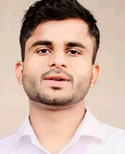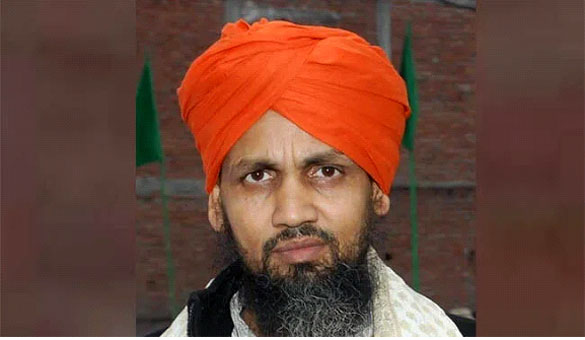Allama Maqbool Ahmad Salek Misbahi of Maharajganj in Uttar Pradesh: Scholar and Reformer

By Sahil Razvi, New Age Islam
17 April 2025
Islamic Scholar And Reformer Allama Maqbool Ahmad Founded Key Educational Institutes, Authored Impactful Works, And Promoted Rural Upliftment. His Death In 2023 Marked The End Of A Life Dedicated To Bridging Faith, Education, And Social Progress.
Main Points:
1. Founded Jamia Khawaja Qutbuddin Bakhtiyar Kaki (Delhi) to bridge traditional Islamic and modern education.
2. Co-authored Jahan-e-Mufti-e-Aazam-e-Hind, a landmark biography of India’s Grand Mufti.
3. Prioritised rural education with institutes like Maihdul Atfaal in Maharajganj.
4. Launched Voice of India magazine to promote Arabic literacy and Islamic scholarship.
5. Passed away (28 Sep 2023), leaving a global legacy of empowerment through education.
------

Allama Maqbool, Courtesy: dailyhindustanexpress.com
-----
Recently, during a conversation with a friend, I was introduced to the life and legacy of a deeply revered Islamic scholar whose humility and piety left an indelible mark on countless lives. As my friend recounted his tireless efforts for Islam and society, I was struck by my own lack of awareness about such an influential figure. This luminary was none other than Allama Maqbool Ahmad Salek Misbahi, whose work in Islamic education, social reform, and academic progress remains unparalleled.
In the realm of Islamic scholarship and educational reform in India, few figures have left as profound a mark as Allama Maqbool Ahmad Al-Salek Al-Misbahi. Born in Lalpur, of Maharajganj district in eastern Uttar Pradesh, Al-Misbahi emerged as a distinguished scholar of Arabic literature and Islamic studies, dedicating his life to bridging traditional Islamic teachings with contemporary educational needs. His contributions to academia, institution-building, and community upliftment reflect a legacy rooted in intellectual rigour and social consciousness.
Al-Misbahi’s academic journey began at Al-Jamiatul Ashrafia, a renowned Arabic university in Mubarakpur, Azamgarh, where he earned his degree in Islamic studies. His quest for deeper knowledge led him to Lucknow, where he spent four years specialising in Arabic literature at Nadwatul Ulama, an institution celebrated for its synthesis of traditional and modern Islamic education. Equipped with scholarly expertise, he embarked on a teaching career, initially serving as a lecturer in Arabic literature at his alma mater, Al-Jamiatul Ashrafia.
Recognising the gaps in Islamic education, particularly in urban centres, Al-Misbahi assumed leadership roles at prominent institutions. He served as the head of teachers at Jamia Hazrat Nizamuddin Al-Awliya in New Delhi and later lectured at Markaz Al-Thaqafatus Sunniyah in Calicut, Kerala. However, his vision extended beyond teaching. Driven by the urgent need for a modernised Islamic educational framework, he founded Jamia Khawaja Qutbuddin Bakhtiyar Kaki in Delhi in 2001. Named after the revered Sufi saint and successor of Khwaja Moinuddin Chishti, this institution aimed to harmonise classical Islamic sciences with contemporary curricula, enabling students from madrasa backgrounds to pursue higher education in Indian universities.
The seminary, located in Madanpur Khadar Extension, was inaugurated on 17 September 2006 at a conference attended by eminent scholars and community leaders. It soon became a hub for nurturing both spiritual and intellectual growth, addressing the socio-educational backwardness prevalent among Muslims. Al-Misbahi’s emphasis on “enlightening the new generation” underscored his belief in education as a tool for empowerment.
Al-Misbahi’s scholarly output further cemented his reputation. He co-authored ‘Jahan-e-Mufti-e-Aazam-e-Hind’, a groundbreaking biography of India’s Grand Mufti, Hazrat Mustafa Raza Khan Noori. This collaborative work, involving scholars like Allama Muhammad Ahmad Al-Misbahi and Allama Abdul Mabeen Al-Nu’mani, garnered acclaim for its research depth and became a reference text globally. Nearly 200 scholars from India, Africa, Europe, and America contributed to this monumental project, highlighting its transnational significance.
To counter the scarcity of Arabic publications in India, he launched ‘Voice of India’, a magazine aimed at promoting Arabic literacy and disseminating Islamic knowledge. This initiative not only fostered intellectual discourse but also strengthened cultural ties within the global Muslim community.
Beyond urban centres, Al-Misbahi focused on rural education. In Maharajganj, he established ‘Maihdul Atfaal’, an institute providing foundational education to underprivileged children. Later recognised as a semi-government school, it exemplifies his commitment to grassroots upliftment. He also served as an honorary supervisor at Jamia Kamiliya Miftahul Uloom in Kolhui Bazar, advocating for curricular reforms to align traditional madrasa education with modern pedagogical practices.
Al-Misbahi’s life epitomised the belief that education is the cornerstone of societal progress. By founding institutions that blend religious and secular knowledge, he sought to equip Muslims with the tools to navigate modernity while preserving their spiritual identity. His efforts addressed systemic issues, ignorance, socio-economic marginalisation, and cultural disconnection, by creating platforms for intellectual and moral growth.
On 28 September 2023, Allama Maqbool breathed his last at a Delhi hospital after battling illness, leaving his global community of followers in profound grief. His funeral prayers, attended by mourners from far and wide, were held in his native village, a place close to his heart, where he was finally laid to rest. The emotional scenes of his admirers bidding him farewell underscored the profound impact he had on their lives and the void his passing has left in the realms of Islamic scholarship and social service.
In conclusion, Allama Maqbool Ahmad Al-Salek Al-Misbahi’s contributions transcend mere academic achievements. His legacy lies in institutionalising a holistic educational model that empowers communities, fosters intercultural dialogue, and ensures the transmission of Islamic values to future generations. As challenges of globalisation and cultural assimilation persist, his vision remains a guiding light for equitable and enlightened progress.
(Note: This article incorporates significant contributions from Dr. Seraj Ahmad Misbahi Sahab, whom I duly acknowledge and credit for his valuable insights and research.)
-----
A regular contributor to New Age Islam, Sahil Razvi is a research scholar specialising in Sufism and Islamic History. He is an alumnus of Jamia Millia Islamia.
New Age Islam, Islam Online, Islamic Website, African Muslim News, Arab World News, South Asia News, Indian Muslim News, World Muslim News, Women in Islam, Islamic Feminism, Arab Women, Women In Arab, Islamophobia in America, Muslim Women in West, Islam Women and Feminism
